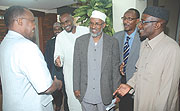KIGALI - A delegation of Somali Clerics and Civil Society members who have been in the country on a 4-day working visit said they will draw lessons from Rwanda’s unity and reconciliation model to restore sanity in the war-torn Horn of Africa country.


KIGALI - A delegation of Somali Clerics and Civil Society members who have been in the country on a 4-day working visit said they will draw lessons from Rwanda’s unity and reconciliation model to restore sanity in the war-torn Horn of Africa country.
The delegation led by Sheikh Ismail Abdi Hure, yesterday met with the Minister in-charge of Cabinet Affairs Protais Musoni who briefed them on the progress the country has taken since 1994.
Hure is the Mufti of Somaliland, a relatively peaceful region forming the Northern part of the mainland Somalia.
Addressing the press shortly after the meeting held at the Prime Ministers office, Sheikh Hure and his delegation said they would return to Somalia with a message of peace. He said the delegation will also urge all Somalis to drop arms and embark on development just like Rwanda has done for the last 15 years.
The group said that if Somalia can draw lessons into the reconciliation and reintegration processes Rwanda adopted after the 1994 Genocide against the Tutsi, and the Somali people adopt techniques employed by Rwanda to achieve economic progress, the country would be back on track.
Minister Musoni took the Somali delegation through Rwanda’s strategy in dealing with the aftermath of the Genocide which focussed on employing home grown solutions for quick and log term recovery.
"We (Rwanda Patriotic Front) wanted a national solution. We never wanted to be like the genocidal regime that had marginalised a group of people. We wanted to be diverse and therefore had to be inclusive in character.”
"We also realised that once you have many problems, you cannot attend to all of them at once. You must prioritise and put some things first and then build from the successes,” Musoni who was representing PM Bernard Makuza told the group.
He added that the participatory and incremental approach meant that the leadership focussed on priority needs like security and stability in the first 2 years and then rehabilitation, repatriation and resettlement followed there after.
Beginning with 2000, the government embarked on short term and long term development strategies including Vision 2020, decentralisation, gender, unity and reconciliation as well as delivering justice.
The Somali group noted that Rwanda’s story is outstanding worldwide and provides a lot of lessons to other parts of the world. They hailed the country leadership that managed to deliver the country from shambles to prosperity.
"Rwanda today remains a true success story and a role model for the rest of Africa and the world, and to Somalia in particular, that unity and development are achievable with unity and common purpose of the nation,”
"This is therefore to salute the President of the Republic of Rwanda, H.E Paul Kagame and the people of Rwanda who sacrificed to unite the country to realise today’s success.” A Joint statement issued by the group after the visit reads.
The group was in the country on a study tour organised by the Interfaith Commission of Rwanda and the Rwanda Muslim Association under the Mufti of Rwanda Sheikh Saleh Habimana.
Ends


